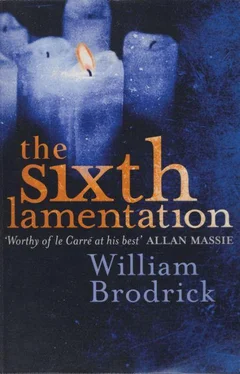William Brodrick - The Sixth Lamentation
Здесь есть возможность читать онлайн «William Brodrick - The Sixth Lamentation» весь текст электронной книги совершенно бесплатно (целиком полную версию без сокращений). В некоторых случаях можно слушать аудио, скачать через торрент в формате fb2 и присутствует краткое содержание. Жанр: Триллер, на английском языке. Описание произведения, (предисловие) а так же отзывы посетителей доступны на портале библиотеки ЛибКат.
- Название:The Sixth Lamentation
- Автор:
- Жанр:
- Год:неизвестен
- ISBN:нет данных
- Рейтинг книги:5 / 5. Голосов: 1
-
Избранное:Добавить в избранное
- Отзывы:
-
Ваша оценка:
- 100
- 1
- 2
- 3
- 4
- 5
The Sixth Lamentation: краткое содержание, описание и аннотация
Предлагаем к чтению аннотацию, описание, краткое содержание или предисловие (зависит от того, что написал сам автор книги «The Sixth Lamentation»). Если вы не нашли необходимую информацию о книге — напишите в комментариях, мы постараемся отыскать её.
The Sixth Lamentation — читать онлайн бесплатно полную книгу (весь текст) целиком
Ниже представлен текст книги, разбитый по страницам. Система сохранения места последней прочитанной страницы, позволяет с удобством читать онлайн бесплатно книгу «The Sixth Lamentation», без необходимости каждый раз заново искать на чём Вы остановились. Поставьте закладку, и сможете в любой момент перейти на страницу, на которой закончили чтение.
Интервал:
Закладка:
4
Wilma unplugged the television and left the bedroom. The door clipped shut. For a long while Anselm tried to read the motionless face of the woman waiting to die. Nothing moved. There was just a slow blinking and then a welling-up of tears that ran into the soft creases of her skin.
Now was as good a time as any, thought Anselm. On this day of death there should be powerful words about life. He cleared his throat. ‘Agnes, I have something to tell you.’
She raised a finger off the bedspread.
‘I know you had a son, Robert, and that he was taken away from you.
She reached for his hand.
‘You have lived as though he were dead.’
She turned her head, applying the lightest of pressure to Anselm’s fingers.
‘Victor did not betray you. He took your boy and protected him. I have met Robert. He is very much alive.’
Agnes suddenly raised herself from the bed, startling Anselm, and rasped out a thick sound of pain or wonder. She fell back, gripping Anselm’s hand. Her mouth moved round the shape of words but nothing broke into sound.
Anselm said, ‘He’s tall.’ A squeeze.
‘In comparison to me, moderately handsome.’ A squeeze.
‘I understand he’s a prodigy on the piano.’
A frail, lingering squeeze.
‘He’s married to a charming woman. She’s called Maggie.’
Her strength had gone; her fingers lay warm and still within Anselm’s hands.
‘They have five children. Some of them are married and they, too, have children. Agnes, you are not only a mother… you are a grandmother and a great-grandmother.’
Her lips pursed into a loop, her eyes wide and swimming. Somehow the years were stripped back and Anselm sensed the ambiance of youth, captured by Victor Brionne in the photograph seen earlier that afternoon. He immediately recognised her for who she was, and who she had become; they were one and the same.
Wilma bustled in, carrying a teaspoon, a saucer and a bowl of ice cubes.
5
Lucy was taken back to her cell. Half an hour later the heavy door swung open with a bang. Lucy was waved out by an impatient hand and taken to the Custody Sergeant’s desk. Father Conroy was still there, beside DI Armstrong, who said: ‘The Detective Superintendent says you can go home. You’re bailed for a week. When you come back there’ll be an interview After that you may be charged.’
Lucy collected her personal belongings, signed more forms and Father Conroy led her outside. On the street he said, ‘Come on, I’ll drive you home.’
As he pulled away into a stream of traffic, Lucy said evenly:
‘They both deserved to die.’
‘Say that to Father Anselm.’
‘Why?’
‘He’s always full of surprises.’
‘About what?’
‘Convincing appearances.
They did not speak for the rest of the journey Father Conroy dropped her in Acre Lane.’ near her flat. As Lucy stepped on to the pavement he said, ‘Nothing’s what it seems, you know Don’t worry.
Out in the cold she walked hurriedly to her door, fighting a growing sense of having stained herself by wanting to savour revenge, because she hoped Agnes had seen the news and felt the same: that she too had sought pleasure in watching the keeper of the flame extinguish himself.
Part Four
‘They will come again, the leaf and the flower, to arise
From squalor of rottenness into the old splendour…’
(Laurence Binyon, ‘The Burning of the Leaves’, 1942)
Fourth Prologue
Agnes could no longer lift her arms or head, but her fingers moved and she could still use the alphabet card if everything was held in place. There were still some things that had to be said.
She was fed by drip now, procured by Freddie when he insisted that his mother would not die in a hospital bed but in her own home. Everyone diligently fussed over her needs, not realising that Agnes didn’t care, knowing nothing of the carnival that raged out of sight.
For within her the heavens were lit by repeated explosions of fireworks, with every shade of blue and green and yellow and red, splintering into trillions of gleaming particles against a vast stream of silver, dancing stars. They fell as a shower upon her raised head, on to her lashes, balancing precariously on each curved, counted hair before tumbling joyously over into the abyss beneath, where she would soon follow after the reunion with Robert that would surely come. She had entered upon a timeless, enduring, secret benediction.
Chapter Forty-Five
1
The reliability of a wartime revolver after decades in a cupboard was literally a hit and miss affair. Unlike capsules of potassium cyanide. Which struck Anselm as a happy imbalance in the scheme of things, given Lucy’s misguided attempt to provoke Victor’s suicide.
It transpired that Victor had had no intention of killing himself at all. Like all men who have known grave dependence on alcohol, he had a certain clarity of mind that was sharpened when drunk. And so, confronted with a young woman whose level of foolishness reflected the degree of her distress, he’d thought it prudent to accept the offered gun. After Lucy had gone he’d pointed the barrel at his face, looking into the dark, narrow hole. It had been, he said, a sort of playing, an acting out of the preliminary steps to an oblivion that had its attractions but which he would not choose. How could he? No matter what personal suffering he had endured, no matter the scale of moral compromise, there was Robert, the children and the grandchildren. They rose like flowers from the catastrophe of his life, and their splendour, however circumscribed, had a fragile, redemptive quality. He lived for them. And now, Victor had learned that they lived for Agnes.
And yet, but for the protecting hand of luck, Victor would have shot himself. Upon lowering the barrel, the hammer suddenly discharged, held back (it turned out) by a hairline trigger. The round went off, destroying a rare copy of Doctor Johnson’s dictionary that had cost Victor most of his retirement lump sum.
Victor was kept in hospital overnight, on account of his bitten lip and presumed shock, and released the next morning, whereupon Anselm paid him a welcome visit at home.
‘As I told you before,’ said Victor, ‘I had always seen the irony of my predicament — on paper, I was the one who had betrayed The Round Table. So when I came to England I decided to set the record straight, if you will forgive the expression. The idea came to me when I was wondering how I might conceal my identity still further. I decided to change my name a second time. What name? I thought.’
‘Brownlow?’ interjected Anselm with a faint, querying smile.
‘The man who rescued Oliver Twist,’ replied Victor. For him it was an old joke, lame but enduring, a sniff at adversity.
‘Of course,’ snapped Anselm. ‘I knew I recognised it.’
Abandoning the advantages his education and talent would have brought him, Victor then chose factory work as a long-term hiding place. For most of his employed life he stood by a conveyor belt putting lids on jars of mustard. He saved what he could for Robert’s precocious talent at the piano. He met Pauline, his wife-to-be, at a church fair bookstall. Nature ran its course and she became a mother to Robert, but he was old enough to remember her coming into his life.
‘When he was old enough to understand, I told him his real mother had died during an air raid. Disasters are always convincing.’
For twenty-six years Pauline had been his strength, the woman to whom he confided all that had happened. When she knew she was going to die from a rare kidney complaint she wrote Victor a letter, to help him after she had gone. But they were lifeless words, shapes in ink. He used to stare at them, trying to summon up the voice that had once spoken to him, her passion, her belief in him, her constant forgiveness for the wrongs of which he was a part. He’d been to confession.
Читать дальшеИнтервал:
Закладка:
Похожие книги на «The Sixth Lamentation»
Представляем Вашему вниманию похожие книги на «The Sixth Lamentation» списком для выбора. Мы отобрали схожую по названию и смыслу литературу в надежде предоставить читателям больше вариантов отыскать новые, интересные, ещё непрочитанные произведения.
Обсуждение, отзывы о книге «The Sixth Lamentation» и просто собственные мнения читателей. Оставьте ваши комментарии, напишите, что Вы думаете о произведении, его смысле или главных героях. Укажите что конкретно понравилось, а что нет, и почему Вы так считаете.












